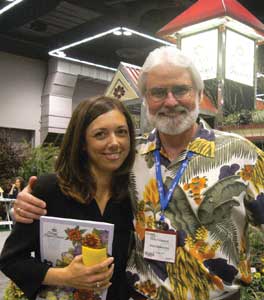9/19/2008
Inside the New Skagit Gardens with CEO Chris Colasono
Jennifer Duffield White

In 1998, International Garden Products, owner of Iseli Nursery and Weeks Roses, purchased Skagit Gardens from founders Jim and Ruth Youngsman, giving IGP a blend of woodies, conifers, roses, annuals and perennials for independent garden centers.
We didn’t hear much about IGP or Skagit for a decade. Then along came the news that Skagit, based in Mt. Vernon, Washington had been sold to a venture capital group.
What led up to Skagit splitting away from IGP? During the recent Far West Show in Portland, Oregon, we caught up with Skagit President and CEO Chris Colasono for the inside story.
GrowerTalks: Why did IGP decide to sell Skagit?
Chris Colasono: IGP has had capital investors for quite some time. And typically, with these venture capitalists, it’s five years and then they want to get out. They’d been investing in IGP for about 10 years. So they’d gone twice their normal time before saying, “We want our return on investment.”
For the past five years Skagit has had a really nice story. Impressive top- and bottom-line improvements. It’s a good story. Plus, most of the venture capitalists are used to manufacturing. In manufacturing you can say, “Show me what your sales are going to be against booked orders.” If you know the color business—annuals and perennials—there’s very little pre-booking. It made them very uncomfortable every spring. … After ten years of it they said, “The story is good, but we want to get out of it.” Not that they didn’t like it—they loved it—but it just made them uncomfortable.
GT: Who are the new owners?
CC: Aequitas Capital Management, out of Lake Oswego, Oregon. Their investments are very diversified. Fortunately, they have some ag exposure, so they understand the cycles, which is very important to us. The management team got to help pick Aequitas. … When you have a new owner, chemistry is critical. They know little about the industry, so they bought the management team. They determined, “Okay, if this management team is why the story looks good, then that’s what we’re buying. Let’s not mess it up.” Their strength to us is that they’re not a short-term venture capitalist. They don’t have an exit strategy. That gave us great comfort.
GT: What changes will Aequitas bring?
CC: Aequitas will bring strategic planning strength, plus support for our liner expansion plans. We’re currently at 30% liners, 70% finished. Down the road it will closer to 50/50, we think.
GT: That retail business is all independents, right? What about chains?
CC: Nope, nope. We do not sell to home centers or mass merchants. You can’t serve two masters. You’ll love one and hate the other—I’ve seen that before. We’re very committed to the independents, and they appreciate that, so that’s our business plan.
GT: Are you optimistic about the state of the industry right now?
CC: Yeah, I am, Absolutely.
GT: What gives you that optimism?
CC: (Laughs) I’m a farmer, a glorified crop rotator. Why else would I be doing this for 35 years? You’ve got to wake up optimistic every day! … Even with the [bad] economy, when it’s tough, people have a tendency to hang around their homes. What we grow—we add color and beauty. People need that. We have plants that you like to touch, and that make you feel good. There’s that contact with nature. I don’t see that ever going away. In fact, it will probably become more important as we become more impersonal and disconnected with each other because of technology.